While daily soaps are here to stay, there is a huge space for other kind of shows- Vikas Gupta
In conversation with the game changer Vikas Gupta, who dared to make shows like 'Kaisi Yeh Yaaiaan' and 'Gumrah' during the saas bahu saga wave...
Published: Friday,Jun 09, 2017 16:39 PM GMT-06:00

A TV show may be a starry treat from the outside but has a million factors that make it the presentation it becomes, be it ranging from a broadcaster to producer and director, the audiences stay unaware to the above factors. And if there is one thing that connects these links than that is the content on television and the characterization of the same.
And this is the same belief producer Vikas Gupta follows. The man who rides high on the success of several youth shows spills some beans on the lesser known side of television. Infact, the man moved to Mumbai with no plans of making it into television or films. With a smile he shared that how in small towns, people only know about the industry comprising of directors, producers and actors. The Creative minds and Executive Producers are not even heard of.
Indian television content has always been under the scanner for presenting hardcore saas-bahu sagas or as we call, melodrama maximized. And to get an in depth understanding into this expertise, India Forums got on a table with former broadcaster and current ace producer Vikas Gupta (Lost Boy Productions), whose vision towards youth-centric' shows is commendable!

Vikas, you started as a creative in the most successful family saga of all time, 'Kyunki Saas Bhi Kabhi Bahu Thi', and today you are seen as a prominent figure in developing youth content. How did this shift happen?
To begin with, I have not been to college. Even today, my only ambition in life is to go to college but my parents thought I was only meant for business. Hence, I left home and came to Mumbai. I never really thought of a career in this industry. Even today in small towns, people don't know what creative heads and executive producers (EPs) are. Things were completely different when I came here. At 17, I worked with Mr Bhimsen Khurana, who was my first boss. Later, I started working with Balaji Telefilms after trying my hands at a couple of films. It was at Balaji, when I realized that storytelling is the most exciting aspect of this industry. I did not quite know as to what I wanted to do, but I did have a clear direction. I was enjoying the process, and at 19 I was heading 'Kyunki Saas Bhi Kabhi bahu Thi.'
Then I was involved in almost
all their shows and the film division. Not many know that Balaji is one of the
first ones who started working on new media. The boom may have occurred now but
they started working on the same, seven years back. After working for a
considerable time, I felt stagnant doing the same job. I was a creative
director and after doing the same stuff again and again, I felt the need to
change.
At 23, I was bored and I had taken a break for a year. Travelling opened my
brains and Prithvi became my new office. Soon, I was doing plays and meeting
people. These encounters made me realize that there is a scarcity of
programming for a lot of people. The dramas that we were doing caters to a
certain audience and the rest remains uncatered. That's when I got the idea of
doing youth shows, and 'Gumrah' was born.
The reason I make shows the way they are, is that I amalgamate my learning of realism and entertainment. Luckily, under Lostboy Productions, we have always maintained the principle of telling a story the way it is meant to be told. Usually, all stories are same and its how you narrate them is the difference.
Post Gumrah, there was a show called 'The Serial' which was real life version of Entourage, which was a fantastic concept. From being television's Anurag Kashyap, we went on to become television's Karan Johar with Yeh Hai Aashiqui. The biggest success point that I witnessed was when the top three youth shows on top three channels belonged to LostBoy Productions. After covering these facets I wanted to do something more exciting and that's when MTV offered me to head their programming and I took it up. Working with MTV made me a lot more confident and happy too.
Finally, 'Kaisi Yeh Yaariaan' happened and it became a landmark show. This was MTV's entry into fiction almost after a decade and one to remember. After having a good experience with them, I took up programming at And TV. Here, my philosophy at And TV was that programming should be distinct. Anything that is coming on Sony TV or Star Plus should not come on And TV as that would be the edge it needs. I made sure, we were choosing concept based shows.
After all this, I am now focusing completely on Lostboy.
You have been both a broadcaster and maker and you have experimented with programming in both vertices. How do you take up that challenge and adapt audiences to it?
Only a channel has the guts to experiment, whereas a producer is concerned with telling the story. Ultimately, it's the channel who takes the decision to experiment with the shows and I cannot appreciate Star Plus channel enough for experimenting with the content the way they do. Shows like Everest or POW hit the screen and even though, they did not work in the sensibilities of ratings, people pursued these unusual' concepts. Even Colors channel continued to telecast the second season of 24, which is amazing. Even though these experiments may not be conventionally resulting to you, they are needed to be done. People are used to certain kind of shows and it takes time for them to adapt to something new.
There was a time when mythological sagas were only telecast on weekends. Then Shailja from NDTV Imagine came up with Ramayana which telecast Monday to Friday and it was the biggest hit show they ever had. Experimentation is the true game! While, daily soaps are here to stay, there will always be a huge space for other kind of shows as well.
The only problem is that at times, we forget who are we catering the show to and whom are we making the show for. You cannot make a totally off-beat show and bring it on a channel which is catering to housewives. A mother will not understand a show like 24, if she is an avid Balika Vadhu viewer. Hence, ultimately, the game is all about understanding the audiences!
A maker has to balance between the distributor, the audiences and creative demands; how do you overcome the challenge?
Both the channel and producer want the same thing when it comes to introducing a new show. At times, we hear stories about how channels are forcing a producer, but in my case I have been fortunate to work with the most cooperative channel partners. They have always given me extreme freedom and we both work on the same thing and that is to get the maximum number of people to watch the show.

While you are up for experimenting and making out of the box shows; there is hurdle of ratings as audiences take time to adapt. So, can you ignore the rating factor in this business?
I make shows for people to watch; I don't make shows for myself. A lot of times, when film guys come to television, they have an opinion of what television should be like, or what people should be watching and hence they like to teach. I, on the other hand believe that if you want to tell stories, you have to tell stories in the language the audiences understand. You cannot be telling Tamil audiences in Hindi, saying, "This is a better language to speak." So I think that balance is very important. While I believe that better stories having bigger budgets and better vision should be told; telling stories completely alien won't be sane as ultimately you need audiences to watch the show. You cannot preach the ideation but can change the conventional way of storytelling by first adapting to it and then changing it.

What are your views on the trends that television follows? You have been associated with Balaji and as aware, Naagin has set the trend of supernatural genre across. Do you feel that this walk with the flock idea makes things monotonous?
This phenomenon is not just in India, but all over the world. If a particular thing is working, everyone, internationally wants to follow the same. However, the difference lies on how one presents it. Everyone wants to break it to the audiences and it is obvious to follow what is working. The track of Naagins was first introduced in 'Sasural Simar Ka' which was then made into a whole show by Ekta. The next thing we know that it went on to become one of the biggest hits ever and many others adapted it too. But, it was the manner in which Balaji presented it, that could not get replicated. Currently the fight is between Chandrakanta and it's quite nice, let's see who makes it better?
As storytellers, we should be intelligent enough to justify the concept. What happens at times is that people just pick a trend for the sake of it and then cannot execute it well, thus killing a good trend. There is a whole boom of weekend programming also which needs to be focused on.
What is the your view of digital content? Is it influencing TV programming in any way?
I really think people who are making content online are the ones who have the content that they can't use for a film or a TV show for various reasons. Digital has become an alternate to it, which, according to me, is wrong. They do not know who their audiences are? They keep saying that they are making shows for youth. While Pitchers and Tripling are good shows, but they cater to 15 Year olds and for the ones who are 25 and above. There is no show for ones who are 25 and below.
The good part, however, about digital platform is that there's not a particular form of viewership. Its not just women or youth watching, its one and all, thus making it a mix bag. You could have a million dollar show on digital platform and have a 5000 dollar home-made show and even then the latter could beat the former. So, content is the actual king and that's what everything is made for. The idea of digital space overlapping TV will not happen, as the latter's audience primarily contains women who are not going to watch it on their mobile phones. And that is because their way of watching TV is multi-tasking as they work along with watching TV.
The audience that the digital space is trying to bank on is the office-going people who did not watch TV anyway. For example, Pedder Road kids were not watching daily soaps anyway and they would rather do anything else.
The audience will keep growing for digital as there was no content for that audience. Currently, all the youth programming is shut except MTV. But think about it, where is the content for 15-18, while everyone is claiming that youth has moved to digital but where is the content for that age group? I don't think there is duplication of audience, there is separate audience for it.

So when you say there is no duplication of audience, what about the catch up TV? A huge chunk of traction is from catch up, so don't you think there is a role of device and convenience than content shift?
India is one television household country and people want to watch different shows. Programs here are not that brilliant that people are watching them on TV and internet. So there is no duplication. For catch up TV, these are the people who never used to watch TV, this is an original audience, who have started watching on OTTs. It is the people who can't watch it on a certain time.
On the Lostboy front, what is in the pipeline?
Digitally, there is lot of exciting work happening which we are producing for Ekta Kapoor. Also, there is something going on with And TV and other GECs. We would like to tell stories which are told differently. The shows have to be a hit, I don't make them for myself, I want the audiences to watch it. Every maker should have his own style; when you see a Balaji show you can tell it's Ekta's show and for a Rajan's (Shahi) show it reflects his signature. That is good and that marks and differentiates every maker's style. All of us, as artists would want things to be balanced right with the commercial value and intelligence; as it is not just meant for our creative satisfaction alone but also meant to be sold.

What is your message to people who are aspiring to have a journey like yours?
I want to convey that believe in yourself and believe that you are as good as I am or anyone for that matter. The disconnect is that you are thinking about doing it and we are doing it. Come here and do it and it will happen! Don't seek for a way, there is no process. Believe in it, industry is a supportive place. People see passion and hard work as everyone's an artist here.
Just go ahead and do it. My mantra this year is do the things I have never done. That's how one will achieve things that one hasn't.
Join Our WhatsApp Channel
Stay updated with the latest news, gossip, and hot discussions. Be a part of our WhatsApp family now!
Join NowYour reaction
 Nice
Nice Great
Great Loved
Loved LOL
LOL OMG
OMG Cry
Cry Fail
Fail








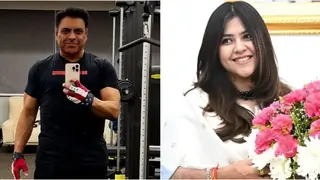
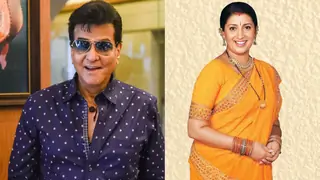

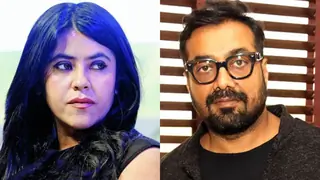
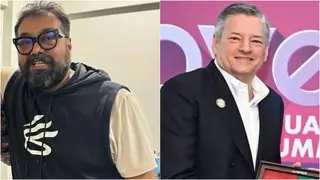
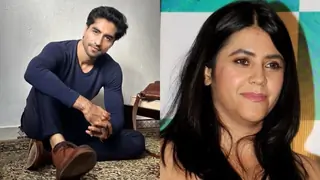









3 Comments